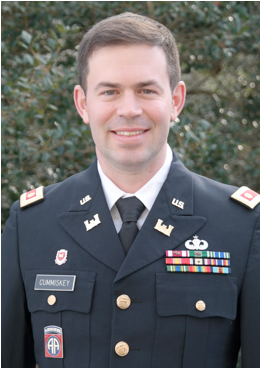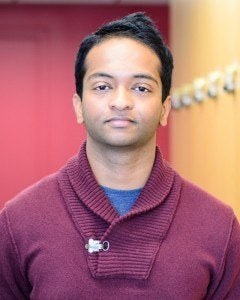Our students have a wide range of backgrounds and diverse experiences. See what brought them to the Department, what they’re up to now, and where they’re looking to go.
Kevin Cummiskey
PhD Biostatistics
You are in the Army…tell us how your military career began.
I feel like I should have an inspirational story, but it’s actually not that exciting. I got accepted to West Point after high school and it seemed like a tremendous challenge, so I did it. It was the mid 90’s and the world seemed safe. The potential dangers associated with my decision were far more abstract (especially to an 18-year-old) than they are to the young men and women who join today. This June will mark 20 years since I first put on a military uniform and what began as a youthful adventure has evolved into a lifelong commitment.
How does an Army officer end up at HSPH?
I am headed back to West Point to serve on the faculty upon completion of my degree. Military officers with PhD’s make up a large part of the faculty at West Point.
What do you like best about the department and HSPH?
This is an easy question: the people. There are so many brilliant and dedicated people here doing exciting research across a wide variety of critical areas. One might think that going from the military to Harvard would be a culture shock, but that hasn’t been my experience at HSPH. Selfless service is at the heart of both professions. Like in the military, everyone here is dedicated to something bigger than themselves and those kinds of organizations are very special to be a part of.
What do you see yourself doing in 5-10 years?
I’m imagining someplace exotic, with a beach perhaps. I’ll still be in the Army, so there’s a much higher probability I’ll either be at West Point, the Pentagon, or one of several Army analysis centers located across the country. There’s an open invite to come visit me if I’m at West Point; it’s a wonderful place.
Is there anything else you would like people to know about you?
Yes, I need to thank my family. Serving in the Army is a commitment from the whole family. This would not be possible without the love and support of my wife. Nine years of marriage, eight different addresses, and two wonderful kids…it’s an adventure that has brought us very close and I couldn’t imagine being on this journey without them.
The above statements are those of Kevin Cummiskey and do not represent the official position of DoD, the Army or West Point.
Divy Kangeyan
I am a second year PhD student.
Tell us about the path that brought you to Boston and the Department, including how you became interested in Biostatistics and Computational Biology.
I was born and bred in Sri Lanka. I came to the US about 7 years ago. Unlike many of my peers, I studied biomedical engineering in my undergrad. I did a summer program at Ohio State University on building phylogenetic trees based on DNA sequences using Bayesian statistics. This project was my first exposure to biostatistics and I had a great time working on it. I started switching my interest from more of a device engineering focus to computational engineering. At the end of my undergrad year I worked on a global health project on building affordable microscopes for malaria detection. My part was mainly to develop image detection tools. Before I started graduate school I worked as a bioinformatics intern at Novartis which further solidified my interest in biostatistics and computational biology.
What do you like best about the Department, School and Boston?
It is great to study biostatistics in one of the focal points of biomedical research in the country. More than the location, I admire the faculty members who conduct interesting research in a wide range of topics in biostatistics, my peers who not only give me intellectual support but also moral and social support, and the staff members who are the lifeblood so that we can function as a department. In terms of the university, most of Harvard outside of Longwood is still uncharted territory for me. I would like to explore it while I am here, of course!
Although not as swift as New York, I do like Boston as a city. It is great that there are several universities around here. I especially like going to MIT and surrounding institutes at Main Street for meetups and other events. As I am from the tropics, however, I don’t like the winter in Boston. It is nice seeing the snow for the first time or two but after that it’s just misery every day!
What do you see yourself doing in 5 years? In 20 years?
In 5 years I just have a modest plan where I graduate and hopefully continue doing research in the intersection of statistics and genomics. In 20 years I have more of a visionary plan – professionally, I would like to lead my own research group and personally, I would like to get to know the cultures and world around me. Above all, I come from a country that was ravaged by one of the bloodiest civil wars. I was fortunate enough to get out of there and have the resources to be where I am now. I think it is my moral obligation to help those in Sri Lanka who were not as fortunate as myself or didn’t have any resources. This will definitely be part of my future plans.
Is there something unusual about you that you’d like everyone to know?
I won’t call the following unusual, but one of my interests is something that I don’t see many other people have now. I am an avid collector of stamps. I started collecting when I was 7. My interest grew further when my brother– who was also a stamp collector– lost interest in it and I “inherited” his collection. Since then I have expanded my stamp empire to 2,000 stamps strong from over 100 different countries thanks to my relatives and friends, including Jaffer and Alex who contributed to it! But nowadays people rarely use stamps so my rate of collection has been declining 🙁





